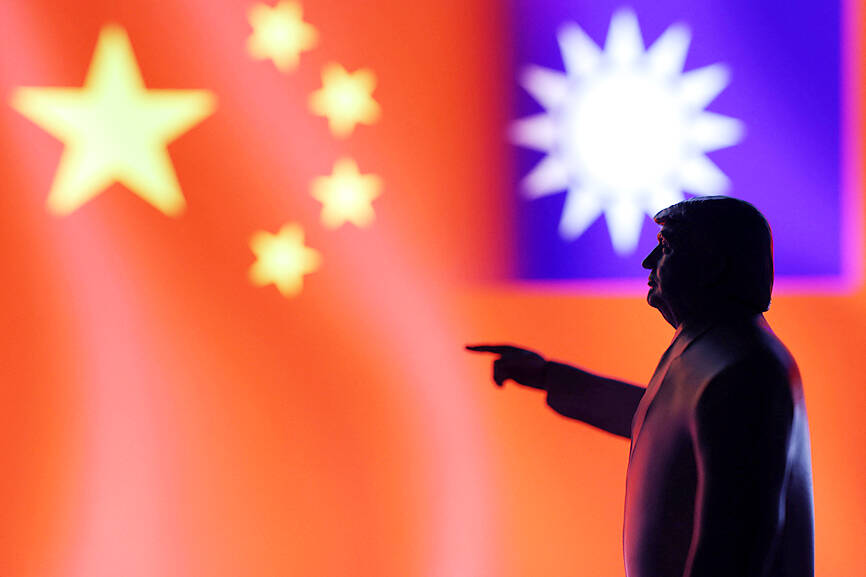A former White House official on Sunday said he does not believe US President Donald Trump would ever use Taiwan as a bargaining chip in dealings with Chinese President Xi Jinping (習近平).
“Taiwan has been a core national interest of the United States. Taiwan’s autonomy and sovereignty have been a core interest of ours for decades,” said Alexander Gray, who served as deputy assistant to the president and chief of staff of the National Security Council during Trump’s first term.
“I don’t see any reason why President Trump would ever, for the first time in his eight years as president, compromise on a core interest of the United States,” he said in an interview with the Central News Agency.

Photo: Reuters
However, he expressed concern that due to domestic politics, Taiwan has not demonstrated sufficient resolve to raise its defense spending.
Although he believes that Taiwan is moving in the right direction with its defense reforms, Gray said the scale of Taipei’s planned budget increases remains inadequate given the magnitude of the threat from China.
For this year, the Cabinet allocated NT$647 billion (US$21.52 billion) for defense, equal to 2.45 percent of GDP. President William Lai (賴清德) has repeatedly pledged to raise that figure above 3 percent of GDP.
Gray recently visited Taiwan and spoke at the annual Ketagalan Forum: Indo-Pacific Security Dialogue in Taipei earlier this month.
Asked about some of the topics raised during his visit, Gray said that many of his conversations in Taiwan centered on complaints about Trump’s trade policy.
However, he said that such concerns overlook a deeper shift in Washington’s stance.
“This [higher tariff] is not going to change, and I don’t think the next president, Republican or Democrat, is going to change it either,” he said.
“That’s a new reality that we have to face ... and if we keep arguing the premise, we’re wasting time and we’re distracting ourselves,” he added.
Trump has made it clear that he views trade policy “as separate from strategic policy,” he said. “He [Trump] thinks we can have a great strategic relationship while having very real concerns about a country’s trade policy.”
Gray, who served on the 2016 presidential transition team at the US Department of State, said that during Trump’s first term, the president had sought to impose higher tariffs on several countries, but was blocked by his secretary of defense, secretary of state and national security adviser, who raised concerns about damaging strategic partnerships.
“None of that’s happening anymore, because there’s an understanding in this administration that these are two separate issues,” Gray said, adding that Taiwan should adapt to this new reality.
He suggested that Taipei could appeal to Trump on bilateral trade by boosting investment in the US and committing to projects that “create jobs,” thereby strengthening its case for lower tariffs.
The US on Aug. 7 imposed a baseline 20 percent tariff on Taiwanese goods, higher than the 15 percent levied on imports from Japan and South Korea, raising concern about the impact on Taiwan’s economy.
After the announcement, Lai said Washington remained open to further tariff discussions, adding that the two sides have yet to finalize a trade deal and calling the tariff “provisional.”

A preclearance service to facilitate entry for people traveling to select airports in Japan would be available from Thursday next week to Feb. 25 at Taiwan Taoyuan International Airport, Taoyuan International Airport Corp (TIAC) said on Tuesday. The service was first made available to Taiwanese travelers throughout the winter vacation of 2024 and during the Lunar New Year holiday. In addition to flights to the Japanese cities of Hakodate, Asahikawa, Akita, Sendai, Niigata, Okayama, Takamatsu, Kumamoto and Kagoshima, the service would be available to travelers to Kobe and Oita. The service can be accessed by passengers of 15 flight routes operated by

Chinese spouse and influencer Guan Guan’s (關關) residency permit has been revoked for repeatedly posting pro-China videos that threaten national security, the National Immigration Agency confirmed today. Guan Guan has said many controversial statements in her videos posted to Douyin (抖音), including “the red flag will soon be painted all over Taiwan” and “Taiwan is an inseparable part of China,” and expressing hope for expedited reunification. The agency last year received multiple reports alleging that Guan Guan had advocated for armed reunification. After verifying the reports, the agency last month issued a notice requiring her to appear and explain her actions. Guan

GIVE AND TAKE: Blood demand continues to rise each year, while fewer young donors are available due to the nation’s falling birthrate, a doctor said Blood donors can redeem points earned from donations to obtain limited edition Formosan black bear travel mugs, the Kaohsiung Blood Center said yesterday, as it announced a goal of stocking 20,000 units of blood prior to the Lunar New Year. The last month of the lunar year is National Blood Donation Month, when local centers seek to stockpile blood for use during the Lunar New Year holiday. The blood demand in southern Taiwan — including Tainan and Kaohsiung, as well as Chiayi, Pingtung, Penghu and Taitung counties — is about 2,000 units per day, the center said. The donation campaign aims to boost

The Central Weather Administration (CWA) said a magnitude 4.9 earthquake that struck off the coast of eastern Taiwan yesterday was an independent event and part of a stress-adjustment process. The earthquake occurred at 4:47pm, with its epicenter at sea about 45.4km south of Yilan County Hall at a depth of 5.9km, the CWA said. The quake's intensity, which gauges the actual effects of a temblor, was highest in several townships in Yilan and neighboring Hualien County, where it measured 4 on Taiwan's seven-tier intensity scale, the CWA said. Lin Po-yu (林柏佑), a division chief at the CWA's Seismological Center, told a news conference